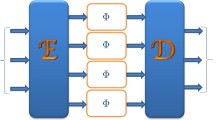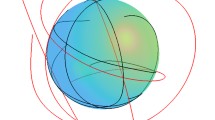Abstract
A non-unitary non-coherent space-time code which is capable of achieving full algebraic diversity is proposed based on full diversity space-time block coding. The error performance is optimized by transforming the non-unitary space-time code into unitary space-time code. By exploiting the desired structure of the proposed code, a grouped generalized likelihood ratio test decoding algorithm is presented to overcome the high complexity of the optimal algorithm. Simulation results show that the proposed code possesses high spectrum efficiency in contrast to the unitary space-time code despite slight loss in the SNR, and besides, the proposed grouped decoding algorithm provides good tradeoff between performance and complexity.
Similar content being viewed by others
References
Marzetta T L, Hochwald B M. Unitary space-time modulation for multiple-antenna communications in Rayleigh flat fading. IEEE Trans Inform Theory, 2000, 46(2): 543–564
Marzetta T L, Hochwald B M. Capacity of mobile multiple-antenna communication link in Rayleigh flat fading. IEEE Trans Inform Theory, 1999, 45(1): 139–157
Hochwald B M, Marzetta T L, Richardson T J, et al. Systematic design of unitary space-time constellations. IEEE Trans Inform Theory, 2000, 46(6): 1962–1973
Zhao W L, Leus G, Giannakis G B. Algebraic design of unitary space-time constellations. IEEE Int Conf Commun, 2003, 5: 3180–3184
Gamal H E, AKtas D, Damen M O. Non-coherent space time coding: an algebraic perspective. IEEE Trans Inform Theory, 2005, 51(7): 2380–2390
Damen O, Chkeif A, Belfiore J C. Lattice code decoder for space-time codes. IEEE Commun Lett, 2000, 4(5): 161–163
Tarokh V, Kim I M. Existence and construction of noncoherent unitary space-time codes. IEEE Trans Inform Theory, 2002, 48(12): 3112–3117
Damen M O, Gamal H E, Beaulieu N C. On the design of quasi-orthogonal constellations: filling the empty threads. IEEE Vehicul Technol Conf, 2003, 3: 1753–1756
Horn R A, Johnson C R. Matrix Analysis. Cambridge: Cambridge University Press, 1985. 400–401
Tarokh V, Seshadri N, Calderbank A R. Space-time codes for high data wireless communications: performance criterion and code construction. IEEE Trans Inform Theory, 1998, 44(3): 744–765
Kay S M. Fundamentals of Statistical Signal Processing-Estimation Theory. Englewood Cliffs, NJ: Prentice-Hall, 1993. 203–207
Author information
Authors and Affiliations
Corresponding author
Additional information
Supported by the National Natural Science Foundation of China (Grant No. 60372055), and the National Doctoral Foundation of China (Grant No. 20030698027)
Rights and permissions
About this article
Cite this article
Guo, Y., Zhu, S. Non-coherent space-time code based on full diversity space-time block coding. Sci. China Ser. F-Inf. Sci. 51, 53–62 (2008). https://doi.org/10.1007/s11432-007-0054-1
Received:
Accepted:
Issue Date:
DOI: https://doi.org/10.1007/s11432-007-0054-1




